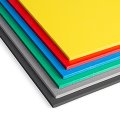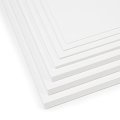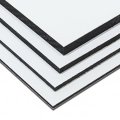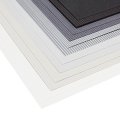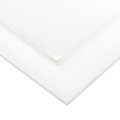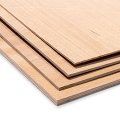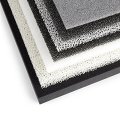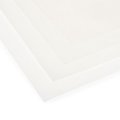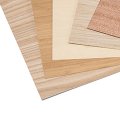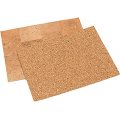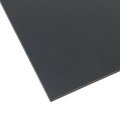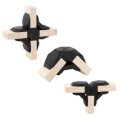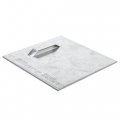PLEXIGLAS® Sheets
PLEXIGLAS® or acrylic glass? PLEXIGLAS® is the protected brand name for all acrylic glasses from Röhm (formerly Evonik). You will also find acrylic sheets from other manufacturers, which usually differ only slightly in quality.
Crystal Clear PLEXIGLAS® - Properties and Application
PLEXIGLAS® or acrylic - what's the difference? We are often asked that. PLEXIGLAS® is primarily the protected brand name for all acrylic glasses from the manufacturer Röhm (formerly Evonik). Acrylic glass is the collective or generic term for materials made of the thermoplastic polymethyl methacrylate (PMMA), which includes all acrylic glasses from different manufacturers. But what distinguishes PLEXIGLAS® from the plastic glasses of other manufacturers?
PLEXIGLAS® and acrylic glass - identical or fundamentally different?
In terms of quality, PLEXIGLAS® and the acrylic glasses of other manufacturers differ only slightly. The PLEXIGLAS® manufacturer gives a very long guarantee for its colorless PLEXIGLAS®, e.g. for high light transmission, hail resistance and against yellowing. Visually, minimal differences in color, transparency or between satin-matt versions can only be detected on close inspection.
The fact that all transparent plastic sheets are commonly called PLEXIGLAS® is due to the historical development of the material: Chemist Otto Röhm was the first to produce the transparent rigid plastic on an industrial scale in 1933. He used the name PLEXIGLAS® for marketing purposes.
PLEXIGLAS® Sheets - The Glass Alternative for Indoors and Outdoors
PLEXIGLAS® is only about half the weight of glass and, according to the manufacturer, has a breaking strength eleven times higher than its heavyweight relative. Combined with its higher light transmission, excellent weather resistance and comparatively simple thermal and mechanical processing, the plastic glass is therefore a popular alternative to conventional glass. As a thermoplastic, PLEXIGLAS® can be formed under heat and at temperatures between 150 °C and 160 °C. This property opens up a wide range of applications, for example, in the automotive industry. This property opens up many possible applications, e.g. in trade show, store and model construction. Its normal service temperature is between -40 °C and +70 °C, making it perfectly suitable for outdoor use.
Possible applications - PLEXIGLAS® in universal use
Whether transparent, opaque or satinized, whether colorless or colored, you can use PLEXIGLAS® sheets wherever light weight is required. Transparent PLEXIGLAS® provides the necessary transparency for showcases and displays in trade show and store construction and as picture frame glass. The translucent, colored and satinized grades are suitable for sign and lightbox manufacturing and as decorative furniture doors that also provide privacy. As good conductors of light, the sheets are an easy material to work with in the construction of luminaires, light objects and in illuminated advertising. Since wind and weather cannot harm the durable plastic, the range of applications extends to balcony cladding, greenhouse glazing and outdoor signage, among others.
Buying PLEXIGLAS® - our wide range for different requirements
We offer PLEXIGLAS® sheets in thicknesses from 0.5 to 8 mm and in smallest formats from 120 x 250 mm up to sheet sizes of 1500 x 2000 mm. The range extends from transparent to translucent to opaque, and covers a further 10 colors in addition to the colorless grades. Milky white PLEXIGLAS® in five different translucencies completes the color palette. Sheets with a satin finish on one or both sides complete the selection with their matte surfaces. Especially for professional picture framing, you can also buy non-reflective PLEXIGLAS® with UV protection from us.
PLEXIGLAS® GS and XT
There is an important difference between cast PLEXIGLAS® (GS) and extruded, i.e. drawn PLEXIGLAS® (XT). GS is the higher-quality grade that should always be used when PLEXIGLAS® sheets are to be drilled, sawn or milled. XT melts faster during this processing, smears drills and saws and retains a white cutting edge. In return, it is less expensive than the cast panels. In terms of surface quality, visible transparency and resistance to weathering and aging, there are hardly any differences between PLEXIGLAS® XT and GS.
PLEXIGLAS® cut to size
If you cannot find the size you want in all our sheet formats, you can buy PLEXIGLAS® from us cut to size.
All PLEXIGLAS® sheets that cannot be cut with a cutter can be cut to size according to your wishes and ideas. For information on the minimum cutting dimensions, prices and instant cutting in the Modulor shop, please see the product page of the respective PLEXIGLAS® grade and our customisation page. You can discover our entire cutting range for the PLEXIGLAS® area here.
Machining PLEXIGLAS®
Cutting and drilling PLEXIGLAS®: Table circular saws, jigsaws and routers with fine-toothed saw blades, as well as lasers, are suitable for cutting and machining PLEXIGLAS® sheets. To obtain cutting edges that are as transparent as possible, we recommend adding a little washing-up liquid. A clever alternative for cutting sheets up to 3 mm thick is the so-called scribe breaking. This involves scoring the panel several times with an acrylic cutter and then breaking it at a table edge. When drilling, the use of drill bits with a point angle of 60° to 90° and drilling oil helps to produce smooth holes.
Bonding PLEXIGLAS®
Small-surface bonding and bonding of PLEXIGLAS® to other materials such as wood, metal or cardboard are best achieved with the plastic adhesive Ruderer. Acrifix is suitable for high-strength, almost colorless bonds - also in the surface area. You can achieve a completely invisible adhesive bond with the solvent dichloromethane.
Polishing PLEXIGLAS®
To give the plastic sheets a high-gloss surface, we recommend a lint-free special polishing cloth and acrylic polishing paste. The paste is adapted to thermoplastics and reduces the formation of stress cracks. Deeper scratches and rough cut edges need a more vigorous treatment with wet sandpaper in grit sizes 320 - 400 - 600 - 1000 beforehand.
Even more acrylic and PLEXIGLAS®
In addition to our range of PLEXIGLAS® sheets, we also offer equally high-quality acrylic glass from other manufacturers in the form of sheets, tubes, rods, cubes and spheres. In our materials library you will find a lot more useful information on the properties, application and processing of this versatile rigid plastic.
